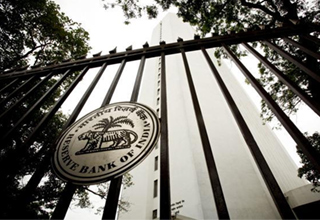Tendency to brandish bank failures as frauds: RBI Dy Governor
Updated: Nov 15, 2013 01:17:38pm

Mumbai, Nov 15 (KNN) There is a tendency on the part of sanctioning authorities in public sector banks to "brandish" their credit appraisal failure as a fraud perpetrate by the borrower even if he has maintained a good banking relationship with the bank, RBI Deputy Governor K C Chakrabarty has said.
“… we observe a tendency on part of the sanctioning authorities to brandish their credit appraisal failure as a fraud perpetrated by the borrower. I am not sure how a borrower who has maintained good banking relationship with the banks for a few years suddenly becomes a fraudster. My assessment of the situation is that, in such cases more often than not, it is the failure of the credit appraisal and post disbursement supervision processes which results in accounts becoming non-performing or being classified as fraud. This state of affairs in public sector banks is a reflection of a general lowering of guard by the vigilance administrators in banks,” Chakrabarty said in his recent address on vigilance in banking.
He said in banks, credit related decision making has a very high potential for indulging in unfair and corrupt practices, but at the same time, it is extremely difficult to establish that officials have resorted to such practices. One of the manifestations of the vigilance failure is a sharp increase in the number of high value advance related frauds especially in the public sector banks.
However, there are definitional incongruities surrounding fraud and there is a need to draw a clear distinction between a crystallization of business risk taken in normal course and a fraud. “My own view is that unless the borrower disputes his liabilities or the advance is not utilized for creating any asset or its deployment is in complete disregard to the purpose for which the sanction and disbursal is made or unless fund is siphoned off by the borrower, the advance should not be treated as a fraud.”.
He said an analysis of large value frauds (greater than Rs 50 crore in value) has thrown up some interesting conclusions like an inordinate delay in declaring the accounts as fraud, covering too many officials in the probe, holding junior officers responsible for frauds etc.
In frauds in consortium/Multiple Banking arrangements, while some banks do not find any staff accountability, several others do the opposite. As per RBI analysis out of 719 officers who were found accountable in 230 large value fraud accounts in the banks over a period of time, 426 officers were up to the rank of Senior Manager, 196 officers were Chief Managers and AGMs, 94 officers were of the rank of DGM, GM and CGM and only 3 Officials were from the Top Management and the Board of Directors.
“This statistic highlights the skewed nature of our punitive vigilance process and its tendency to focus on the lower level functionaries. Another factor which greatly erodes the efficacy of the vigilance function is the disconnect between the punishment meted out and the offence. We observe that in public sector banks, most of the officials found liable were let off with minor penalties- caution, warning, censure, and stoppage of increments for limited period etc. which sends out a wrong message - a message about passive tolerance rather than active intolerance towards misconduct! Incidentally, private and foreign banks operating in India adopt a no- nonsense approach as reflected by the quantum of penalties imposed for similar misdemeanours including dismissal from service.” (KNN/PC)











